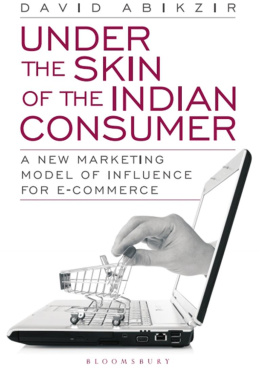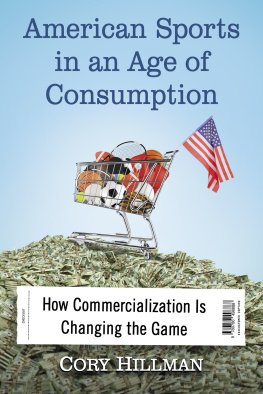Content

Under the Skin of the Indian
Consumer
Under the Skin of the
Indian Consumer
A new marketing model of
influence for e-commerce
By David Abikzir

First published in India 2017
2017 by David Abikzir
All rights reserved. No part of this publication may be reproduced or
transmitted in any form or by any means, electronic or mechanical, including
photocopying, recording, or any information storage or retrieval system, without prior
permission in writing from the publishers.
No responsibility for loss caused to any individual or organization acting on or
refraining from action as a result of the material in this publication can be
accepted by Bloomsbury or the author.
The content of this book is the sole expression and opinion of its author, and
not of the publisher. The publisher in no manner is liable for any opinion or views
expressed by the author. While best efforts have been made in preparing this
book, the publisher makes no representations or warranties of any kind and
assumes no liabilities of any kind with respect to the accuracy or completeness
of the content and specifically disclaims any implied warranties of
merchantability or fitness of use for a particular purpose.
The publisher believes that the content of this book does not violate any
existing copyright/intellectual property of others in any manner whatsoever.
However, in case any source has not been duly attributed, the publisher may
be notified in writing for necessary action.
BLOOMSBURY and the Diana logo are trademarks of Bloomsbury Publishing Plc
E-ISBN 978 93 86643 018
10 9 8 7 6 5 4 3 2 1
Bloomsbury Publishing India Pvt. Ltd
Second Floor, LSC Building No.4
DDA Complex, Pocket C 6 & 7, Vasant Kunj
New Delhi 110070
www.bloomsbury.com
Created by Manipal Digital Systems.
To find out more about our authors and books visit www.bloomsbury.com.
Here you will find extracts, author interviews, details of forthcoming
events and the option to sign up for our newsletters.
No human being seems satisfied with the reality in which he lives his daily life. He has always tried to go beyond it, to transcend it so that it accommodates the one in which he wants to live in.
He transforms his constructed reality into an actual truth. Far from being absolute, it suffers from the personal appropriation of the individual which only has meaning in his tortured mind into a reality that he deconstructs.
Veritas est adquatio intellectus et rei. Saint Thomas Aquinas, father of scholastic philosophy in the XIIIth century, was not wrong in asserting that truth is a representation or a copy of reality and not reality itself.
Therefore, there is no first reality or absolute truth. The truth is approximated by the successive rectifications of a reality that is built gradually.
It is precisely to overcome this tortuous cycle of experienced reality that many authors have imagined a fictional reality of their society which they have erected in goals to achieve, in ideal reality.
Thus Plato described the mythical island of Atlantis, located beyond the Strait of Gibraltar. An exceptional civilization, engulfed 9,600 years BC.
Similarly, the Augustan City of God, political model of a Christian Republic remains a reality to come.
Or even Thomas More with his famous Utopia whose story still echoes in our modern times.
It was to address the evils of the XVIth century, particularly troubled by wars and poverty, that Thomas More had imagined in Utopia this ideal society, offered as a remedy for the excesses of the society of his time and for the rise of religious intolerance in reviving ancient times in his humanistic and principles and wisdom.
This fictional society, carrier of ideals, had resulted in the creation of a carrier word of meaning: Utopia
In Greek it means no place or no where. It is therefore similar to an imaginary construction, even an ideal whose realization is impossible.
The ambition that man has to make his life better is the result of his virtues and his flaws. It manifests itself in generosity, courage, enthusiasm, exigency but also ignorance, irresponsibility, carelessness or vanity. While it is true that it is in his nature to produce fancy ideas, inhabited by the ambition of dream, he also commits himself towards greater responsibility for a promise of utopian philosophy to a civilization project.
That is thus how beyond individual experiences the history of humanity has fed itself with utopia.
Take the example of the XVIIIth century with the ideals of freedom, equality, enlightened reason, humanism, science, ethics and democracy. Or even of the XIXth century with urban construction, modernity, secular school, free and compulsory, industrialization, democratization of energy, railway, conquest of the world beyond borders. Or more recently, in the XXth century, the democratization of comfort, social rights, womens suffrage, vaccination, access to care, the possible eradication of famine and infectious diseases, the possible universal access to knowledge, secularism and hopes for peace in the world.
In the same vein, we have long believed that compulsory education would seclude ancestral hatreds thanks to the benefits of education; we have long believed that the progress of science would kill superstitions and that universal suffrage would make the rise of dictator apprentices impossible! So many utopias denied by the XXth century. Compulsory courses on citizenship have not eliminated racism, scientific advances have not eliminated superstitions and sects, and universal suffrage did not prevent Hitler access to power!
These utopian ideals belonging to a time of development of a civilization have always been presented as imaginary objectives fixing the cap of a gradual approach towards an impossible goal.
Despite this collective thinking, the history of humanity has shown that Utopia can become reality if the human being really wants it. It therefore bears in itself a great share of impossibility and a hardly appreciable share from the start of possible.
Man went to the moon in the late sixties; it had become feasible after several centuries of Utopia from Cyrano de Bergerac through Mlis and Jules Verne. This dream of space conquest has become a reality whose benefits were multiple for men with telecommunications, geodesy, exploration of the earth and defence.
More than in literary works, utopias becoming realities are omnipresent in social, economic, urban or even medicine fields.
Take the example of molecular research in the field of oncology. The so-called targeted treatments, that is to say customized for each tumour, have long been a sweet dream. In a same way that traditional chemotherapy which destroys all dividing cells including healthy ones, personalized medicine has long remained a sweet utopia. Thanks to the advances in molecular biology research, it is now possible to establish the complete genetic profile of a tumour and thus implement targeted therapies that will reach the Achilles heel of the tumour and thus destroy cancel cells only with fewer side effects.
Serious dose of imagination can allow you to break free from the common and dare utopia, that is to say what does not yet exist but could become real. The utopian dream imposes a research, an ambition to build one day, a new reality that is more attractive than the previous one.







